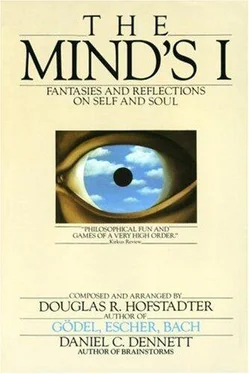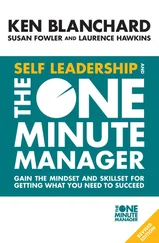Yet this leaves unanswered the most fundamental riddle that each of us must ask: “Why is my unitary feeling of myself propagating down this random branch rather than down some other? What law underlies the random choices that pick out the branch I feel myself tracing out? Why doesn’t my felling of myself go along with the other me’s as they split off, following other routes? What attaches me-ness to the viewpoint of this body, evolving down this branch of the universe at this moment in time?” The question is so basic that it almost seems to defy clear formulation in words. And the answer does not seem to be forthcoming from quantum mechanics. In fact, this is exactly the collapse of the wave function reappearing at the far end of the rug as it was shoved under by Everett. It turns it into a problem of personal identity, no less perplexing than the original problem it replaces.
One can fall even more deeply into the pit of paradox when one realizes that there are branches of this one gigantically branching universal wave function on which there is no evidence for quantum mechanics whatsoever, branches on which there is no Everett or many-worlds interpretation of quantum mechanics. There are branches on which this entire Reflection got written exactly as you see it here, except that ended with a different flutzpah.
D.R.H.
4
A. M. Turing
Computing Machinery And Intelligence [5] Excerpt from “Computing Machines and Intelligence.” Mind, Vol. LIX. No. 236 (1950). Reprinted by permission.
The Imitation Game
I propose to consider the question “Can machines think?” This should begin with definitions of the terms “machine” and “think.” The definitions might be framed so as to reflect as far as possible the normal use of the words, but this attitude is dangerous. If the meaning of the words “machine” and “think” are to be found by examining how they are commonly used it is difficult to escape the conclusion that the meaning and the answer to the question “Can machines think?” is to be sought in a statistical survey such as a Gallop poll. But this is absurd. Instead of attempting such a definition I shall replace the question by another, which is closely related to it, and is expressed in relatively unambiguous words.
The new form of the problem can be described in terms of a game which we call the “imitation game.” It is played with three people, a man (A), a woman (B), and an interrogator (C) who may be of either sex. The interrogator stays in a room apart from the other two. The object of the game for the interrogator is to determine which of the other two is the man and which is the woman. He knows them by labels X, and Y, and at the end of the game he says either “X is A and Y is B” or “X is B and Y is A.” The interrogator is allowed to put questions to A and B thus.
C: Will X please tell me the length of his or her hair?
Now suppose X is actually A, then A must answer. It is A’s object in the game to try to cause C to make the wrong identification. His answer might therefore be
“My hair is shingled and the longest strands are about nine inches long.”
In order that tones of voice may not help the interrogator the answers should be written, or better still, typewritten. The ideal arrangement is to have a teleprinter communicating between the two rooms. Alternatively the question and answers can be repeated by an intermediary. The object of the game is for the third player (B) is to help the interrogator. The best strategy for he is probably to give truthful answers. She can add such things as “I am the woman, don’t listen to him!” to her answers, but it will avail nothing as the man can make similar comments.
We now ask the question, “What will happen when a machine takes the part of A in this game?” Will the interrogator decide wrongly as often when the game is played like this as he does when the game is played between a man and a woman? These questions replace our original “Can machines think?”
Critique of the New Problem
As well as asking “What is the answer to this new form of the question,” one may ask, “Is this new question a worthy one to investigate?” This latter question we investigate without further ado, thereby cutting short an infinite regress.
The new problem has the advantage of drawing a fairly sharp line between the physical and the intellectual capacities of a man. No engineer or chemist claims to be able to produce a material which is indistinguishable from the human skin. It is possible that at some time this might be done, but even supposing this invention available, we should feel there was little point in trying to make a “thinking machine” more human by dressing it up in such artificial flesh. The form in which we have set the problem reflects this fact in the condition which prevents the interrogator from seeing or touching the other competitors, or from hearing their voices.
Some other advantages of the proposed criterion may be shown up by specimen questions and answers. Thus:
Q: Please write me a sonnet on the subject of the Forth Bridge.
A: Count me out on this one. I never could write poetry.
Q: Add 34957 to 78764.
A: (pause about 30 seconds and then give an answer) 105621.
Q: Do you play chess?
A: Yes.
Q: I have K at my K1 and no other pieces. You have only K at K6 and R at R1. It is your move. What do you play?
A: (after a pause of 15 seconds) R—R8 mate.
The question and answer method seems to be suitable for introducing almost any one of the fields of human endeavour that we wish to include. We do not wish to penalize the machine for its inability to shine in beauty competitions, nor to penalize a man for losing in a race against an airplane. The conditions of our game make these disabilities irrelevant. The “witnesses” can brag, if they consider it advisable, as much as they please about their charms, strength or heroism, but the interrogator cannot demand practical demonstrations.
The game may perhaps be criticized on the ground that the odds are weighted too heavily against the machine. If the man were to try and pretend to be the machine he would clearly make a very poor showing. He would be given away at once by slowness and inaccuracy in arithmetic. May not machines carry out something which ought to be described as thinking, but which is very different from what a man does? This objections is a very strong one, but at least we can say that if, nevertheless, a machine can be constructed to play the imitation game satisfactorily we need not be troubled by this objection.
It might be urged that when playing the “imitation game” the best strategy for the machine may possibly be something other than imitation of the behaviour of a man. This may be, but I think it is unlikely that there is any great effect of this kind. In any case there is no intention to investigate here the theory of the game, and it will be assumed that the best strategy is to try to provide answers that would naturally be given by a man.
The Machines Concerned in the Game
The question which we put earlier will not be quite definite until we have specified what we mean by the word “machine.” It is natural that we should wish to permit every kind of engineering technique to be used in our machines. We also wish to allow the possibility that an engineer or team of engineers may construct a machine which works, but whose manner of operation cannot be satisfactorily described by its constructors because they have applied a method which is largely experimental. Finally, we wish to exclude from the machines men born in the usual manner. It is difficult to frame the definitions so as to satisfy these three conditions. One might for instance insist that the team of engineers should all be of one sex, but this would not really be satisfactory, for it is probably possible to rear a complete individual from a single cell of the skin (say) of a man. To do so would be a feat of biological technique deserving of the very highest praise, but we would not be inclined to regard it as a case of “constructing a thinking machine.” This prompts us to abandon the requirement that every kind of technique should be permitted. We are the more ready to do so in view of the fact that the present interest in “thinking machines” has been aroused by a particular kind of machine, usually called an “electronic computer” or “digital computer.” Following this suggestion we only permit digital computers to take part in our game....
Читать дальше











